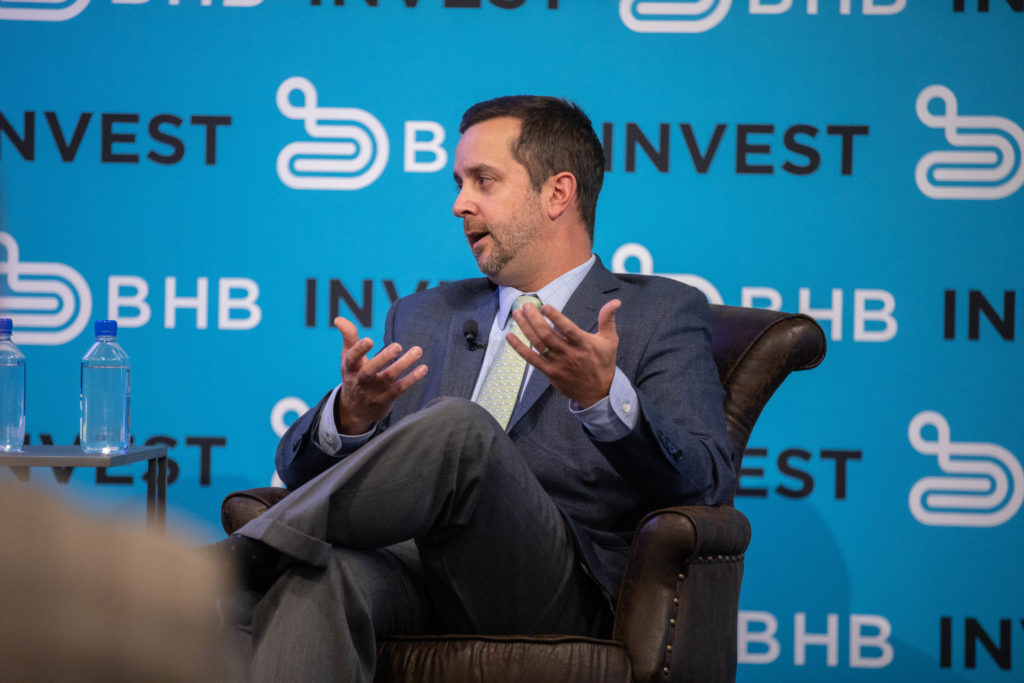Eleanor Health Inc. grew up as a company with the concept of hybrid care models from the start.
That served the Waltham, Massachusetts-based outpatient substance use disorder treatment provider well when Covid forced the entire health care sector into almost exclusively providing telehealth.
“When COVID hit, I think we were probably doing 75 or 80% in-person: So, the technology was sort of a support,” Matt Gagalis, head of business development of Eleanor Health said. “When COVID hit though, we were prepared immediately to pivot.
“We went, in one or two weeks, to 90% virtual with all of our care delivery.”
Gagalis made these remarks as part of a fireside chat at Behavioral Health Business’ inaugural INVEST Conference in Chicago. The chat also included Groups Recover Together Chief Strategy Officer Cooper Zelnick.
The two executives discussed how their organizations — which are built around value-based care — operate differently because of their unique reimbursement model.
Zelnick shared similar sentiments about his organization’s relatively smooth transition to telehealth. Pre-COVID, Groups Recover Together made it a point to provide encompassing services to patients, a tactic meant to ensure impactful care.
And both Gagalis and Zelnick attributed the nimbleness of their companies to their value-based care models.
Groups Recover Together (incorporated as Recover Together Inc.) got its start by providing facility-based opiate use disorder treatment in rural communities in 2014. But they had to change their entire approach to care because of the onset of the pandemic.

As value-based care providers, Groups Recover Together and Eleanor Health stand to lose money or miss out on additional revenue from payer partners if they don’t deliver good clinical outcomes. A prevailing question in behavioral health, especially the addiction treatment space, is whether or not telehealth treatments stand up in terms of effectiveness.
“We spent seven years serving people [via] brick-and-mortar exclusively, and spent the last two serving people digitally exclusively,” Zelnick said. “The first thing we did was understand whether our outcomes held up: Did we deliver the same level of quality in this new modality? We can, and it gives us confidence, not that the future is digital, but that the future is hybrid.”
Zelnick also said that the quality of outcomes didn’t come out different between telehealth and in-person treatments. If this wasn’t the case, telehealth would not have been worth it for Groups Recover Together.
Gagalis said Eleanor Health also found that the outcomes were the same between in-person and telehealth, but added that Eleanor Health “had to try harder to achieve the same outcomes.”
FFS contracting inadequacies ‘shown in stark contrast’ by COVID
Eleanor Health knew that it wanted to operate as a value-based care provider when it started. But the realities of the payer contracting scene meant that it wasn’t always successful starting out.
The fee-for-service (FFS) model of reimbursement — which pays providers simply based on procedures performed — dominated the market then as it does now.
Gagalis said that achieving good outcomes in terms of care quality, patient satisfaction or reducing care costs while getting paid via FFS “was a losing proposition.” The company lost money until it was able to build a body of evidence showing that its clinical model improved outcomes and that payers should enter into value-based contracts to further incentivize said outcomes.
For Groups Recover Together, value-based care contracts empowered its transition to telehealth and its hybrid model. During the same time, traditional FFS-oriented providers suffered because much of their revenue comes from lab testing which can’t be done virtually, Zelnick said.
“So suddenly the ways in which fee for service contracting is inadequate were shown in stark contrast,” Zelnick said. “And we had the ability to say, ‘this model actually allows us to flex and serve your members virtually and in person in a hybrid way.’”

Payers face a ‘chicken or egg question’ with value-based care in behavioral health
The hesitance in the behavioral health industry to get into value-based care, at least from Zelnick’s and Gagalis’ standpoint, comes from the payer side of the equation.
Gagalis supposes that network contracting teams at payors often have a playbook that doesn’t allow for leeway. To get value-based care contracts, the key to making the contract happen is identifying someone within a payer that is seeking innovation and understands that fact a lot of time needs to pass before outcomes show up.
Many major payors face their own quandaries because their systems aren’t built with value-based care compensation in mind.
“We’re going to payers today and saying, ‘Hey, this is how we think we’d like to do this? What do you think?’” Gagalis said. “So I think to the extent that payers start to adopt this and say, ‘Yep, this is the future — we’re going to start investing in building out the model and we’re going to build the infrastructure internally to support those models’ would be huge.
“I think in order to get that — it’s a chicken or egg question. I don’t know what comes first, the payers doing that or more providers going to the payers being willing to adopt those models.”



